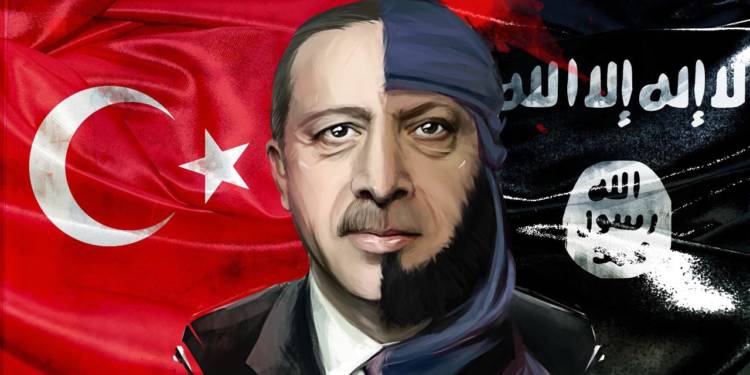The Financial Action Task Force (FATF) is preparing for a virtual meeting in the third week of October. As always, the predictions of Pakistan’s blacklisting have started doing the rounds. Pakistan and Iran have always been on the FATF radar for obvious reasons. While Pakistan is the main harbourer and financer of cross border terrorism in South Asia, Iran, which is already in the FATF blacklist, runs several militias in West Asia.
However, now the focus of the Paris-based global money laundering and terrorist financing watchdog must shift to a bigger issue- Erdoğan’s Turkey, which is fast becoming an ideologue of sorts for Islamist terrorist groups and countries like Pakistan across the world. From Syria to France, and now even India to Armenia, Ankara is shamelessly using proxy terrorists and Syrian mercenaries/fighters to disrupt global peace. FATF itself had felt constrained to warn Turkey last year for its pro-Islamist terror policies.
In December last year, FATF pointed out “serious shortcomings” in Turkey’s approach towards combating money laundering and terrorist financing. The FATF had then warned Turkey that it could get added to the international “grey list”, a move that can lead to some painful consequences for Turkey’s troubled economy.
FATF must have been guided by everything that Turkey was doing in Syria last year. Turkish President Erdoğan’s relationship with the ISIS is an open secret. Last year, Turkey’s Jihadist proxies even carried out a brutal assault into Northeast Syria against the Kurdish fighters. The Turkish assault was more or less aimed at helping ISIS prisoners located in the region.
Nevertheless, what should be of significant interest to the FATF is the fact that the Turkish Intelligence service, MIT has been providing resources and material assistance to the ISIS since 2012. Of course, such covert support cannot be coming without any financial embezzlement and violation of terror financing norms.
Even the United States has continuously raised the issue of indiscriminate Turkish financing to the ISIS. Last year, new American sanctions were also imposed on Islamic State (ISIS) operatives based in Turkey that once again brought up the issue of Ankara’s complacency in cracking down on terror-financing networks. Yet, the Turkish government has not shown the will to combat terror funding networks.
When FATF warned Turkey last year, it was more or less concerned with Ankara’s funding of ISIS fighters and proxies involved in the Syrian civil war. But over the past one year, Turkey’s terror financing networks have expanded to many other parts of the world.
Indian security agencies have been reportedly concerned about Turkey funding anti-India activities, using Pakistani terror groups to foment trouble in India and creating a strong base for ISIS influence in India. Turkey is therefore joining hands with Pakistan to create a combined terrorist front against India. Turkey wants to get as deeply involved in financing terror groups in South Asia as Pakistan itself.
Turkey is unapologetically using Syrian refugees and fighters as terrorist agents in its own armed conflicts in Libya and the disputed South Caucasus region of Nagorno-Karabakh between Armenia and Azerbaijan. Turkey is creating a robust international terror financing network as an instrument of foreign policy. As such Ankara is blatantly violating the anti-terror financing benchmarks created by the FATF.
Turkey’s foreign policy itself relies on using Syrian refugees and fighters as mercenaries and proxy militias. Turkey is of course harbouring and manufacturing radicalised fighters that disturb not only the Middle East but also other parts of the world like Europe. Except probably Pakistan, there is no other country whose terror funding goes as far as Turkey’s.
And as such Syria is no longer the only issue concerning terror financing. Led by an Islamist radical President, Turkey also wants to start financing terror modules in other parts of the world like South Asia. And therefore, Turkey is virtually the biggest threat to the world peace in terms of the terror threat associated with it. Ankara has been given a long rope thus far. And now is the time for the FATF to crack down on Turkey, or else the Islamist regime will keep expanding its terror financing network.



























